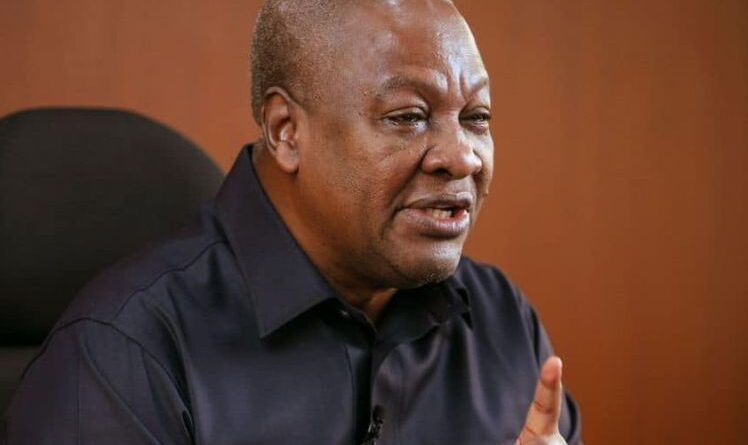Mahama Indicted in A $45M TOR Asset Sale Scandal – South Africa Agent Confess
The Presidential Candidate of the National Democratic Congress, John Dramani Mahama, is involved in yet another allegation of bribery, which, according to “financial records and admissions from the middleman who helped move the money, is a $45 million fraud scandal.”
The report, published on www.thesentyry.org, says that South African businessman Errol Gregor, who is behind plans to build an oil pipeline from Mozambique to landlocked Zimbabwe, was previously involved in a $45 million fraud scandal in Ghana.
Giving details of the TOR deal, it reads, “In 2016, Gregor led South African firm Mining Oil and Gas Services (MOGS) in its attempt to win control of a valuable offshore oil platform near Accra. During the tendering process, he authorized payments totalling $18 million from MOGS to a firm controlled by Edwin Obiri, a Ghanaian deal broker.
According to the report, Obiri, who spoke extensively to the investigators, claims that some $18 million cash, was “funnelled—at the request of Gregor and the political appointee who awarded the contract—to a range of unrelated third parties. Some of the funds reached the political appointee, according to Obiri, and some reached firms controlled by a recent candidate to lead Ghana’s main opposition party, the National Democratic Congress (NDC).”
The documents-backed investigative report was put together by the Sentry, which describes itself as “an investigative and policy organisation that seeks to disable multinational predatory networks that benefit from violent conflict, repression and kleptocracy.”
The 15-year contract, executed in October 2016, less than two months before President John Mahama suffered defeat, is to do with the controversial majority sale of Tema Oil Refinery’s lucrative asset, the Offshore Mooring Concession to an SPV, which gave South African firm, Mining Oil and Gas Services (MOGS) 65% and TOR 35%.
According to Obiri and The Sentry’s review of financial records, Obiri also received shares worth $27 million as part of the deal.
The report stressed that “During the tendering process, MOGS’ purchase of a controlling stake in the company that managed the facility, Ghana Petroleum Mooring Systems (GPMS), raised red flags for possible corruption and fraud. The payments and share transfers to Obiri so alarmed MOGS’ auditors that they queried whether the transactions breached bribery laws.”
After Gregor left MOGS in 2019, the company sued both him and Obiri and referred the matter to the South African police, whose investigation is still ongoing, according to MOGS. It is not confirmed whether Kingsley Awuah Darko, the then Managing Director of TOR, or any other Ghanaian official, has been questioned by South African Police over the bribery allegation.
MOGS claims, in their statement to the South African authorities that “it was the victim of a fraudulent scheme that resulted in payments being made without any legitimate commercial rationale.”
MOGS is part-owned by the Public Investment Corporation (PIC), the asset manager for government employees’ pension contributions. Furthermore, British-based Standard Chartered Bank lent $50 million for the GPMS transaction.
Just over half of MOGS is owned by Royal Bafokeng Holdings (RBH), an investment manager for the Bafokeng community’s royalties from a large platinum mine located in their homeland.
In 2016, South Africa’s PIC, together with a private sector shareholder, bought the remaining 49% of MOGS from RBH. In response to questions from The Sentry, both RBH and the PIC stressed that they had no role in the actions of MOGS in Ghana.
Under Gregor’s leadership, MOGS launched a bid for control of the profit-making GPMS in Tema, responsible for importing roughly four-fifths of Ghana’s fuel.
Floating about five kilometres off the Tema coast, the GPMS facility includes a squat yellow mooring platform, about the size of a small one-story house anchored to the sea bed. The structure allows large tankers to deliver their cargo to the nearby Tema Oil Refinery (TOR) through a hose, without having to enter the shallow port.
Commodity giant Trafigura, after 10 years, returned the structures to Ghanaian state ownership after a 10-year “Build, Operate and Transfer” arrangement that began in 2004.
In 2016, Ghana gifted the infrastructure to the state-owned TOR, which looked for bidders to buy 65% of GPMS and upgrade and operate the facility for a 15-year concession period.
The Mahama administration waived all import duties and taxes for GPMS. Gregor’s MOGS placed a bid in conjunction with Africore Energy, a Dubai-registered firm under the name of Ghanaian businessman Edwin Obiri.
In total, MOGS paid Africore about $45 million in three sets of questionable cash and share transactions: ─ MOGS paid Africore $8.5 million in cash just before and after the tender award. Obiri claimed that this was then paid on to third parties at the behest of Awuah-Darko and Gregor.
The bid was the backdrop for the first set of suspect transactions, before and just after TOR announced that MOGS and Africore had won the bid on October 4, 2016.
After the award, in 2017, Gregor authorized further payments totalling $10 million from MOGS to Africore. Financial records reveal that Obiri funnelled $1.8 million to Awauh-Darko and $2.9 million to entities controlled by a very senior figure in the erstwhile NDC government. Obiri again claims this was done at the behest of Awuah-Darko.
MOGS gave Africore—which provided no funds for the share purchase, had no staff, and was registered in the United Arab Emirates, meaning that it did not qualify as a Ghanaian partner eligible to count toward rules encouraging local participation in the oil sector—shares in the holding company for GPMS worth about $27 million.
All these transactions were questioned by observers or participants in the deal. In a later dispute, Obiri would claim that he merely passed the payments through to unrelated companies at the behest of Gregor and Awuah-Darko.
Auditors raised red flags and asked MOGS whether it had investigated Africore for bribery. After Gregor left MOGS in 2019, the firm sued him, Obiri, and Obiri’s Africore, alleging fraud.
According to The Sentry report, MOGS appeared to fear that Africore could replace MOGS as the partner, believing that Africore held “the better hand” and somehow had either the rights to negotiate with TOR or, alternatively, the rights to buy GPMS shares.
Behind the scenes, there were “intense” interactions in late 2016 between Africore and MOGS and between the two parties and TOR, according to MOGS’ lawyers when defending the deal to MOGS’ suspicious auditors at KPMG.
On September 27, 2016, MOGS wrote to Obiri, agreeing to pay $8.5 million in return for Africore assigning “any rights which might have been vested in it in relation to the Project to MOGS Mauritius,” the holding company MOGS had set up to own GPMS.
MOGS sent the $8.5 million to Africore soon after. First, MOGS drew down $6 million from a PIC credit facility in September 2016.
Then, according to Obiri, after receiving a $6 million payment from MOGS on September 27, 2016, he sent $5 million to a Ghanaian company, RMG DE Ghana, in two installments on October 1 and October 15, 2016. After the first RMG transaction, Obiri sent Awuah-Darko a confirmation email. Obiri claims not to know who is behind those firms, only that he paid the funds to “specific accounts as directed by Kingsley [Awuah-Darko] and Errol [Gregor],” the report says. The records show that RMG DE Ghana, with the company’s directors, Mumuni Haruna and Albert Ekuban, appears to have been instrumental in laundering these funds.
MOGS did not immediately pay for the GPMS shares; the bulk of the payments to TOR were made in January 2017, and MOGS took over the facility on February 14, 2017.
“On December 7, 2016, between when MOGS won the bid and when it completed the deal, Ghana’s ruling party unexpectedly lost the election. TOR’s Awuah-Darko, a political appointee, had backed the losing NDC candidate, President John Dramani Mahama,” the report stated.

